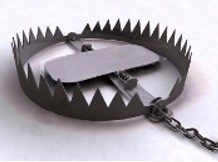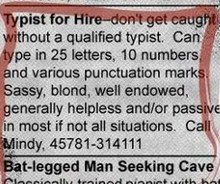"A worthless woman! Mere cold clay
As false things are! but so fair,
She takes the breath of man away
Who gaze upon her unaware."
E. B. BROWNING,
Bianca among the Nightingales. ACCORDING to the trite old adage, "Man, woman, and the devil are the three degrees of comparison," for it has long been agreed that when a woman is bad she far excels man in evil, a maxim which has been upheld by the proverb lore of most countries; a Chinese proverb affirming that "there is no such poison in the green snake's mouth, of the hornet's sting, as in a woman's heart;" and the Italians say that "it is better to irritate a dog than a bad woman," which is similar to the German sayng, "An ill-tempered woman is the devil's door-nail." According to a familiar adage:--
"A wicked woman and an evil
Is three-halfpence worse than the devil," which is to the same effect as the oft-quoted proverb, "A woman and her servant, acting in accord, would outwit a dozen devils;" or, as another version has it, "A woman is some nine points worse than the devil," being much to the same purport as the Italian proverb, "Women know a point more than the devil;" and to Congreve's adaptation of Ovid's lines:--
"Would you increase the craft of womankind,
Teach them new wiles and arts? As well you may
Instruct a snake to bite or wolf to prey;" all of which may be supplemented by Victor Hugo's words, "Men are women's playthings, women are the devil's;" for as our own proverb says, "She-devils are hard to turn."
In the "Hitopadesa,"--one of the choice treasure-houses of Sanskrit wisdom, it is declared that, "Infidelity, violence, deceit, envy, extreme avariciousness, a total want of qualities, with impurity, are the innate faults of womankind;" with which may be compared Goethe's views, "When we speed to the devil's house woman takes the lead by a thousand steps;" and there is a Sinhalese adage, "If you want to go to the gallows without the aid of a ladder, you can go by the aid of a woman."
There is a proverbial saying in Leicestershire, "Shay's as nasty as a devil unknobbed," i.e., a devil who has either never had any knobs fastened on his horns, or else has succeeded in getting rid of them; the phrase illustrating the bovine character of the popular devil; all of which statements recall the passage in Beaumont and Fletcher's comedy of Monsieur Thomas (act iii. sc. 1):--
"Oh, woman, perfect woman! what distraction
Was meant to mankind when thou wast made a devil!
What an inviting hell invented." According to Hindustani proverbial lore, "the elder sister-in-law is the devil's wand, when you see her she stands as straight as an arrow," the meaning being that she is the chief disturber of the family peace; and by a well-known Oriental adage a very bad woman is spoken of as "the devil's aunt." Marathi proverbial wisdom says that "in one fair woman there are seventy-two hidden vices," and that when she has had her fill of wickedness she takes to religion, and we may quote the Sindhi proverb, "Women, land, and money are all three homes of death"--In other words, they are the causes of many murders. An old Latin proverb goes so far as to say that "when a woman is openly bad she is then at her best;" another one illustrating the same idea in a different wording, "A wicked woman is a magazine of evils." It is further said that "it is better to dwell with a dragon than with a wicked woman and there is some truth in this warning if the subjoined couplet be correct:--
"For woman's soul when once plunged in
Knows no stopping place in sin." Alexander Dumas puts into the mouth of an officer of the Paris detective force the well-known expression, "Cherchez la femme"--"Search for the women"--which corresponds with our saying, "Wherever there is anything wrong there is generally a woman in the case," or as Richardson says, "A plot must have a woman in it." Sardou, it may be remembered, introduces the phrase in his drama "Ferréol and George Ebers ("Uarda," vol. ii. cap. 14) says:--
"You forget that there is a woman in this.
That is so all the world over, replied Ameni." Sometimes the expression takes the form of, "Ou est la femme?"--"Where is the woman? Where is she? What is her name?"
Again, it is said, "Women are saints in the church, angels in the street, devils in the kitchen, and apes in bed," a saying which, says Hazlitt, "is rather elaborately illustrated in Jacques Olivier's work entitled 'L'Alphabet de l'Imperfection des Femmes,' which was first published about the year 1617;" and which reminds us of the adage, "Women are demons who make us enter hell through the gates of Paradise." There are many proverbs to the same purport, some of which are couched in stronger language than others. Thus one much used, in days gone by, amongst the peasantry throughout the country says:--
"A woman that is wilful is a plague of the worst;
As well live in hell as with a wit that is curst." And, owing to the fact that the fair sex have from the earliest period been regarded as mischievous, we find them styled "the devil's tools" and "the devil's nets"--a host of other uncomplimentary epithets having been applied to them for which, it must be acknowledged, there is little or no warranty. Pope says, "Every woman is at heart a rake," and Lord Lytton in his "Lady of Lyons":--
"Thou art the author
Of such a book of follies in a man,
That it would need the tears of all the angels,
To blot the record out!" with which may be compared the popular saying, "When a woman thinks by herself she thinks of evil," and with the Italian saying, "It is vain to watch a really bad woman." There can be no doubt, however, that in many of the allusions of this kind relating to women justice has not been done to them, and there is some reason in the proverb of the Italian sisterhood, "In men every mortal sin is venial; in women every venial sin is mortal."
Amongst some of the bad qualities condemned in women, and against which man is warned in our proverbial literature, may be mentioned intemperance, and loose morals. According to one folk-rhyme--
"Women and wine, game, and deceit,
Make the wealth small, and the wants great"-- which is told in various ways. In an old manuscript of the fifteenth century five evils to be avoided are thus summed up:--
"A young man a ruler, reckless;
An old man a lecher, loveless;
A poor man a waster, good-less;
A rich man a thief, needless;
A woman a ribald, shameless:
These five shall never thrive blameless." Another version evidently of this old proverbial maxim communicated to Current Notes for December, 1853, runs thus:--
"A wife that is unchaste is like a filthy sow;
An old man a lecher nothing more to be hated;
A woman unshamefast, a child unchastised,
Is worse than gall, where poison is undesired." Similarly one of Heywood's proverbs tells us how--
"Gaming, women, and wine,
While they laugh, they make men pine;" with which may be compared the adage, "Play, women, and wine undo men laughing;" or, as another version has it, "Women, money, and wine, have their good and their pine." But the illustrations already given show that some of the most severe strictures passed on women are those which relate to unchastity, one or two further instances of which we subjoin:--
"An unchaste wife, working mischief still,
Is oft compared to a foul dunghill." And--
"A woman that spins in vice
Has her smock full of lice." Again, we are told that "A fair woman without virtue is like palled wine;" an Arabian version being, "An immodest woman is food without bait;" or, as it is thus said in some country villages, "A fair woman with foul conditions is like a sumptuous sepulchre, full of corruption;" and further, "She that loseth her modesty and honesty hath nothing else worth losing;" reminding us of the warning often given to those about to get married, "A fair face may be a foul bargain," inasmuch as--
"There cannot be a greater clog to man,
Than to be weary of a wanton woman." The Scotch say, "Ye may drive the deil into a wife, but ye'll ne'er ding him oot o' her," implying that when a woman is once bad there is no chance of reclaiming her; and hence we cannot be surprised at the German proverb, "A bag of fleas is easier to keep guard over than a woman."
But, whether we regard women as good or bad, it is generally agreed they surpass man in either case, for, as the French say, "Women, ever in extremes, are always either better or worse than men," with which may be compared the following lines in Lord Tennyson's "Idylls," "Merlin and Vivien":--
"For men at most differ as Heaven and Earth,
But women, worst and best, as Heaven and Hell." Occasionally old local rhymes allude in somewhat uncomplimentary language to the bad qualities of the fair sex. The island of Iona is separated from Mull by a strait about a mile long. An islet close to the Mull shore opposite the ruins of Iona is designated "The Woman's Island," owing to a tradition of Columba that he would not allow a woman or a cow to remain on his own island. The reason assigned for this ungracious command is embodied in an old folk-rhyme:--
"Where there is a cow,
There will be a woman;
And where there is a woman,
There will be mischief"-- a saying which, we are told, is in certain parts of Scotland repeated as a good-humoured satire on women.
It has long been admitted, even by those who disparage women's virtues, that her memory is excellent when she is anxious to keep anything in mind, and hence it is said that "if a woman has any malicious mischief to do her memory is immortal." Proverbial wisdom, again, tells how worthless and unprincipled women often amuse themselves by dissimulation, even going so far as to feign love: an apt illustration of such sham love from Hindustani proverb runs thus, "I'll love him and I'll caress him and I'll put fire under him; if it burn him what can I do?" and there is a well-known Arabic adage which warns us that, " omen's immorality and monks' wiles are to be dreaded."
Previous Index Next


















































